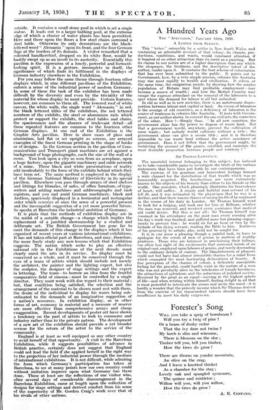A Hundred Years Ago
This " letter," ostensibly by a settler in New South Wales, and containing an admirable account of that colony, its climate, pro- ductions, conditions, and wants, would command attention if it boasted of no other attraction than its merit as a painting. But its claims to our notice are of a higher description than any which the eloquence, the liveliness, and the descriptive talent of the author, confer upon it. It contains the best scheme of colonization that has ever been submitted to the public. It points out to Government, how, by a very simple process, colonies like Australia may rise most rapidly to wealth and civilization. It solves, at the same time, the emigration puzzle, by showing how the surplus population of Britain may find profitable employment—may become a source of wealth ; and how the Mother Country may escape the expense attendant on the removal of the labourers to a spot where the demand for labour is all but unlimited.
In old as well as in new societies, there is an unfortunate dispro- portion between labour and capital or land. An excess of labourers is the scourge of old countries, as a deficiency of labourers is the source of weakness in colonies like Australia. It rests with Govern- ment, as our author shows, to convert, the one evil into the corrective of the other. How f—Simply thus. " In all new countries, the government alone has the power to dispose of waste land. Not that a government would, anywhere, prevent the cultivation of mere waste ; but nobody would cultivate without a title ; the government alone can give a secure title ; and it is therefore impossible to use waste land without the active assistance of government. Does it not follow that the government might, by restricting the amount of the grants, establish and maintain the most desirable proportion between people and territory ? "
SIR THOMAS LAWRENCE.
The mournful interest belonging to this subject, has induced us to take considerable pains to investigate the truth of the various statements that have been put forth by our contemporaries.
The exercise of his generous and benevolent feelings formed a wide channel for the distribution of that wealth which was so honourably acquired. His benefactions are more extensively known to the objects of his bounty than either to his friends or the world. One anecdote, which pleasingly illustrates his benevolence of heart, will suffice. A steady and faithful man-servant of his fell ill, and it was intimated by the physicians that he was in a decline, and that there was no chance of saving his life if he continued. in the course of his duty in London. Sir Thomas himself wont to look for a lodging, and took one for him at Kilburn, whither the man was removed, and received every assistance that medical aid could devise. But this is not all : Sir Thomas himself was constant in his attendance on the poor man every evening after his day's work was finished, and suffered none but pressing engage- ments to prevent him : he would sit for an hour or two by the bedside of his dying servant, reading the Bible to him. Instances of his generos7ty to artists, also, need not be sought for. It is in cne sense a pleasing though a painful task, to have to apologize for the errors of men of genius in matters of worldly prudence. Those who are foremost in proclaiming their failings, too often lose sight of the excitements that surround minds of an original cast, employed upon labours of genius, and rarely descending to the ordinary details of custom. The blandishments of pleasure could not but have had almost irresistible charms for a mind from which emanated the most fascinating delineations of beauty. A fine perception of the charms of colour, a delicately susceptible feeling for the graceful, could hardly exist in the nature of a man who was not peculiarly alive to the witcheries of female loveliness, the attractions of splendour, and the seductions of polished society. Received by the great as an equal—moving in the highest sphere of lifeand when retiring within himself, finding delight in all that is most powerful to intoxicate the senses and incite the mind—it is hardly a wonder that the princely income which Sir Thomas derived from the exercise of his transcendent talents should have been insufficient to meet his daily exigencies.






































 Previous page
Previous page